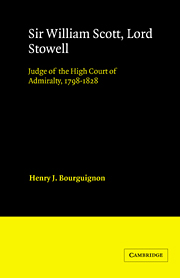Book contents
- Frontmatter
- Contents
- Preface
- List of abbreviations
- 1 Survey of English admiralty jurisdiction: how did it vanish?
- 2 Sir William Scott – a biographical sketch
- 3 The law of the instance court
- 4 Prize law: nationality – a study in detail
- 5 Prize law – a survey
- 6 Scott's judicial philosophy
- 7 Scott's influence
- Appendix: the Stowell notebooks
- Bibliography of primary sources
- Index
- CAMBRIDGE STUDIES IN ENGLISH LEGAL HISTORY
1 - Survey of English admiralty jurisdiction: how did it vanish?
Published online by Cambridge University Press: 29 October 2009
- Frontmatter
- Contents
- Preface
- List of abbreviations
- 1 Survey of English admiralty jurisdiction: how did it vanish?
- 2 Sir William Scott – a biographical sketch
- 3 The law of the instance court
- 4 Prize law: nationality – a study in detail
- 5 Prize law – a survey
- 6 Scott's judicial philosophy
- 7 Scott's influence
- Appendix: the Stowell notebooks
- Bibliography of primary sources
- Index
- CAMBRIDGE STUDIES IN ENGLISH LEGAL HISTORY
Summary
If one were to reflect on the possible functions of a court with special expertise over maritime problems, one would probably surmise that such a court could be used in three broad areas: to settle the many and varied disputes which arose out of the commercial carriage of goods by sea; to reduce friction with foreign princes by adjudicating conflicts which grew out of the capture or plunder of the ships of other states especially in time of war; and to try, convict and sentence individuals for crimes committed aboard ships beyond the knowledge of any jury and outside the jurisdiction of any land-based court. We shall see that the English High Court of Admiralty had jurisdiction, differing in scope from time to time, in these three general areas. Its civil or instance jurisdiction, which ebbed and flowed with the royal favor and support, focused on the wide variety of disputes of the shipping industry, for example, cases involving chartering of vessels, contracts for carrying cargo, seamen's wages, collisions, supplies and repairs to vessels and disputes between part owners of vessels. Its prize jurisdiction concerned, the legality of the capture of vessels and cargoes belonging to persons from other countries and the division of these spoils. Its criminal jurisdiction extended the king's peace to the high seas by punishing acts of piracy, homicides, assaults and other crimes committed on English ships at sea. Parliament could, of course, give the court other power, for example, hearing appeals from colonial vice-admiralty courts.
Long before there was an admiral or an admiral's court for the whole of England, local officials, known as keepers or wardens (custos), had discharged some of the duties later within the admiral's reach.
- Type
- Chapter
- Information
- Sir William Scott, Lord StowellJudge of the High Court of Admiralty, 1798–1828, pp. 1 - 30Publisher: Cambridge University PressPrint publication year: 1987



